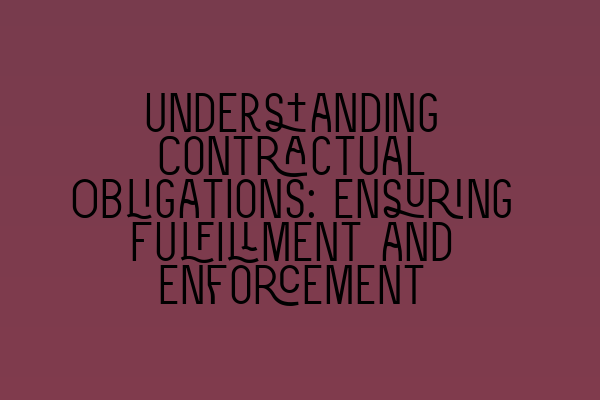Understanding Contractual Obligations: Ensuring Fulfillment and Enforcement
In the world of contract law, ensuring that contractual obligations are fulfilled and enforced is of utmost importance. Contracts are the cornerstone of business transactions and legal agreements, providing a framework for parties to negotiate and define their rights and obligations. It is crucial for solicitors to have a deep understanding of contractual obligations to effectively advise their clients and protect their interests.
But what exactly are contractual obligations? Contractual obligations are the duties and responsibilities that each party agrees to perform under the terms of a contract. These obligations can include various actions, such as delivering goods or services, making payments, providing information, or refraining from certain activities. It is essential for all parties involved to understand and fulfill their contractual obligations to prevent disputes and ensure a successful business relationship.
Enforcement of contractual obligations is key to maintaining the integrity and fairness of the contract. When one party fails to fulfill their obligations, it can lead to financial loss, legal disputes, and damaged business relationships. Solicitors play a vital role in enforcing these obligations by advising their clients on the legal remedies available and representing them in court if necessary.
So, how can solicitors help ensure the fulfillment and enforcement of contractual obligations? Here are some essential steps to consider:
1. Thoroughly Review the Contract: Before entering into a contract, it is necessary to carefully review and understand the terms and conditions. This includes identifying all the contractual obligations for each party involved. Solicitors can assist in this process by conducting a detailed analysis of the contract, ensuring that all obligations are clear, fair, and legally enforceable.
2. Negotiate and Draft Clear Obligations: During the negotiation and drafting phase of a contract, solicitors can help their clients to clearly define the obligations that each party will undertake. Clear and specific language should be used to avoid ambiguity and interpretation issues later on. By ensuring that the obligations are well-defined, solicitors can minimize the likelihood of disputes arising in the future.
3. Include Remedies for Non-Fulfillment: It is essential to include provisions in the contract that outline the consequences of non-fulfillment of obligations. These provisions can include penalties, liquidated damages, or other remedies that incentivize parties to fulfill their obligations. Solicitors can advise their clients on the appropriate remedies to include based on the nature of the contract and the potential risks involved.
4. Monitor Compliance: Once a contract is in effect, solicitors should assist their clients in monitoring compliance with the contractual obligations. Regular review and communication with the other party can help to identify any potential issues or breaches early on. By staying proactive, solicitors can ensure that their clients’ interests are protected and that obligations are fulfilled in a timely manner.
5. Enforce Obligations: In cases where one party fails to fulfill their contractual obligations, solicitors should take prompt action to enforce those obligations. This can involve negotiation, mediation, or, if necessary, taking legal action. Solicitors can represent their clients in court and advocate for the enforcement of the contractual obligations, helping to secure a favorable outcome.
In conclusion, understanding contractual obligations is vital for solicitors to effectively advise their clients and ensure the success of business transactions and legal agreements. By thoroughly reviewing contracts, negotiating clear obligations, including appropriate remedies, monitoring compliance, and enforcing obligations, solicitors can help mitigate risks and protect their clients’ interests.
If you found this article helpful, you may also be interested in reading these related articles:
– Barrister vs. Solicitor: A Comprehensive Comparison
– Embracing the Rise of Virtual Law Practices
– Unveiling Real-Life Case Studies: Insights into Legal Practice and Decision-Making
– Exploring Solicitor Salaries in the UK: Average Earnings and Factors Affecting Income
– Mastering Client Relationship Management: Skills for Solicitors to Enhance Trust and Loyalty
Remember, contract law is a complex field, and seeking guidance from a qualified solicitor is essential for ensuring the fulfillment and enforcement of contractual obligations.
